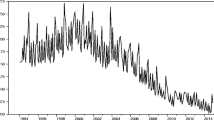Abstract
Like many other countries, the Australian recorded music industry has suffered a significant decline in sales over the last decade or so. While it would be naïve to dismiss digital piracy as a contributor to this decline, there is inconclusive evidence to attribute the entirety of the decline to piracy. Moreover, there are many other salient issues that need to be considered when understanding the observed sales decline. For example, these may include music pricing, changing consumption habits, live performance incomes, and demand externality (network) effects of music consumption. Following the introduction section, this chapter begins by documenting some aggregate level industry sales statistics of the Australian recorded music industry. Beyond these statistics, summary results are also presented from a recent survey on Australian consumers’ file-sharing activities in relation to music. The third section provides an extended discussion of various economic issues which are relevant to a more-rounded discussion of piracy. The fourth section discusses some recent academic studies of digital piracy related to music, while the fifth section reports on a recent econometric analysis of digital piracy in the Australian context from McKenzie (Australian Economic Papers 48(4), 296–307, 2009). The sixth and final section provides some concluding thoughts and comments.
Access this chapter
Tax calculation will be finalised at checkout
Purchases are for personal use only
Similar content being viewed by others
Notes
- 1.
- 2.
Throughout this analysis a rank of one suggests the most popular song of the week.
- 3.
The inclusion of the weekly dummy variables effectively gives a two way error components model.
- 4.
See Anderson and Hsiao (1981).
- 5.
A full description of the collation of ARIA charts can be found at http://www.aria.com.au/pages/aria-charts.htm.
- 6.
The regression of this week ranking on number of (last week) illegal down-loads similarly revealed a statistically significant negative relation. It is therefore evident that this relationship is being driven solely by the relationship in the digital sales market. This is also consistent with the evidence of the partitioned analysis discussed in McKenzie (2009).
- 7.
The quadratic’s inclusion is guided by the non-linearity of rank over song life. See McKenzie (2009) for further details.
References
Anderson, T. W., & Hsiao, C. (1981). Estimation of dynamic models with error components. Journal of the American Statistical Association, 76, 598–606.
Dejean, S. (2009). What can we learn from empirical studies about piracy. CESifo Economic Studies, 55, 326–352.
Elberse, A. (2010). Bye-bye bundles: The unbundling of music in digital channels. Journal of Marketing, 74(3), 107–123.
Frank, R., & Cook, P. (1995). The Winner-Take-All Society. New York: The Free Press.
Heitman, K. (2011). AFACT copyright study warrants scepticism. http://www.efa.org.au/2011/02/17/afact-study/. Accessed 17 Feb 2011.
Liebowitz, S. (2006). File-sharing: Creative destruction or just plain destruction? Journal of Law and Economics, 49, 1–28.
Liebowitz, S. (2007). How reliable is Oberholzer-Gee and Strumpf’s paper on file-sharing. Working paper, University of Texas, Dallas.
Liebowitz, S. (2010). The Oberholzer-Gee/Strumpf file-sharing instrument fails the laugh test. Working paper, University of Texas, Dallas.
McKenzie, J. (2009). Illegal music downloading and its impact on legitimate sales: Australian empirical evidence. Australian Economic Papers, 48(4), 296–307.
McMahon, N. (2011). Billion-dollar booty of the online pirates. The Sydney Morning Herald, March 6, 2011.
Michel, N. (2006). The impact of digital file sharing on the music industry: An empirical analysis. Topics in Economic Analysis & Policy, 6(1), 1–22. Article 18.
Mortimer, J., Nosko, C., Sorenson, A. (2010). Supply responses to digital distribution: Recorded music sales and live performances. Working paper, Harvard University.
Moses, A. (2011). Piracy: Are we being conned. The Sydney Morning Herald, March 22, 2011.
Oberholzer-Gee, F., & Strumpf, K. (2007). The effect of file-sharing on record sales: An empirical analysis. Journal of Political Economy, 115(1), 1–42.
Peitz, M., & Waelbroeck, P. (2004). The effect of internet piracy on music sales: Cross-section evidence. Review of Economic Research on Copyright Issues, 1(2), 71–79.
Rob, R., & Waldfogel, J. (2006). Piracy on the high C’s: Music downloading, sales displacement, and social welfare in a sample of college students. Journal of Law and Economics, 49(1), 29–62.
Rosen, S. (1981). The economics of superstars. American Economic Review, 71(5), 845–858.
Stevans, L., & Sessions, D. (2005). An empirical investigation into the effect of music downloading on the consumer expenditure of recorded music: A time series approach. Journal of Consumer Policy, 28, 311–324.
Waldfogel, J. (2010). Music file sharing and sales displacement in the iTunes era. Information Economics and Policy, 22, 306–314.
Zentner, M. (2006). Measuring the effect of music download on music purchases. Journal of Law and Economics, 49, 63–90.
Author information
Authors and Affiliations
Corresponding author
Editor information
Editors and Affiliations
Rights and permissions
Copyright information
© 2013 Springer-Verlag Berlin Heidelberg
About this chapter
Cite this chapter
McKenzie, J. (2013). P2P File-Sharing: How Does Music File-Sharing Affect Recorded Music Sales in Australia?. In: Tschmuck, P., Pearce, P., Campbell, S. (eds) Music Business and the Experience Economy. Springer, Berlin, Heidelberg. https://doi.org/10.1007/978-3-642-27898-3_6
Download citation
DOI: https://doi.org/10.1007/978-3-642-27898-3_6
Published:
Publisher Name: Springer, Berlin, Heidelberg
Print ISBN: 978-3-642-27897-6
Online ISBN: 978-3-642-27898-3
eBook Packages: Business and EconomicsBusiness and Management (R0)




